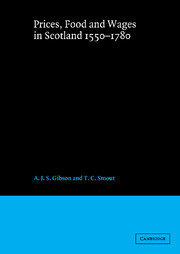Book contents
- Front Matter
- Contents
- Figures
- Tables
- Acknowledgements
- Abbreviations
- A note on Scottish and English money
- Map of Scottish counties and principal burghs
- 1 Introduction
- 2 The system of burgh price regulation
- 3 The system of county fiars
- 4 Press reports of monthly market prices
- 5 Trends and fluctuations in grain-price movements
- 6 The price of animals and animal products
- 7 Food
- 8 Wages in money and kind
- 9 Real wages
- Appendix I Scottish weights and measures, 1580–1780
- Appendix II Accessing the data
- Bibliography
- Persons index
- Place index
- Subject index
2 - The system of burgh price regulation
Published online by Cambridge University Press: 22 September 2009
- Front Matter
- Contents
- Figures
- Tables
- Acknowledgements
- Abbreviations
- A note on Scottish and English money
- Map of Scottish counties and principal burghs
- 1 Introduction
- 2 The system of burgh price regulation
- 3 The system of county fiars
- 4 Press reports of monthly market prices
- 5 Trends and fluctuations in grain-price movements
- 6 The price of animals and animal products
- 7 Food
- 8 Wages in money and kind
- 9 Real wages
- Appendix I Scottish weights and measures, 1580–1780
- Appendix II Accessing the data
- Bibliography
- Persons index
- Place index
- Subject index
Summary
The burghs and market regulation
The extensive records produced by the town councils constitute one of the richest sources available for the history of prices in early modern Scotland. They contain some of the longest price series available, in many cases pre-dating fiars prices by more than a century. Although posing considerable interpretative difficulties, they provide a detailed record of price trends and fluctuations in a period otherwise largely devoid of reliable price data. The grain and grain-product prices, along with wine prices, derived from the town councils form the tables attached to this chapter, which is intended as a guide to their interpretation.
The majority of the prices to be found in burgh records refer to the products of the principal crafts. Wheatbread, ale, tallow and candle prices appear almost annually in some burgh records, but other commodities such as oatbread, ryebread, wine and various kinds of meat appear at least periodically. Even the price of whisky was occasionally set. The burghs also assessed the price of labour, as we shall see in chapter 8. It is, however, important to acknowledge at the outset that most of these prices do not purport to record current market prices, but rather the price at which such goods were to be sold in the future.
The fact that these were ‘statute’ prices – statements regarding the price at which certain goods should be sold – raises immediate problems.
- Type
- Chapter
- Information
- Prices, Food and Wages in Scotland, 1550–1780 , pp. 19 - 65Publisher: Cambridge University PressPrint publication year: 1994



